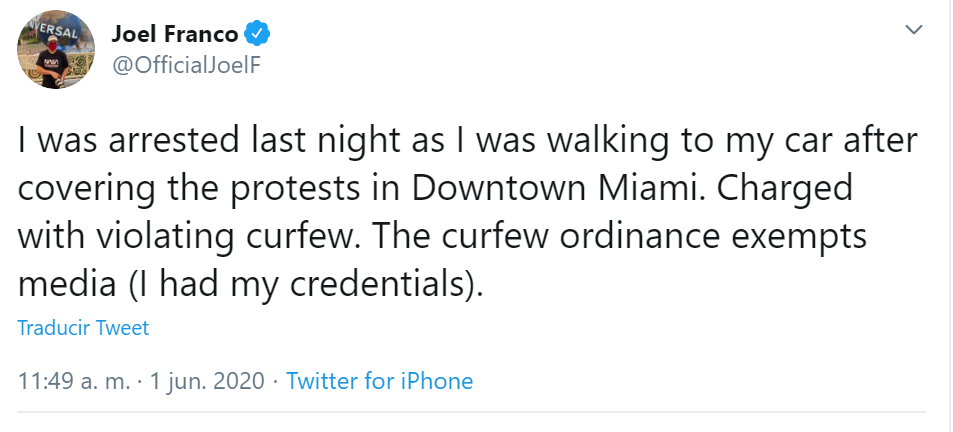Journalists were targeted by multiple police departments in major cities across the United States during protests over the killing of George Floyd by Minneapolis police officers.
Since the killing, protesters have flooded the streets. Ignoring credentials – and freedom of the press – police have put journalists under direct attack. Many have been injured and some have been arrested.
CNN correspondent Omar Jimenez and his crew were arrested on live TV in Minneapolis on May 29. Jimenez quoted the arresting officer as saying he didn’t know why he was arresting him. The next day, Los Angeles Times photojournalist Carolyn Cole was pepper-sprayed in the face during a protest in Minneapolis. Reporter Molly Hennessy-Fiske was also injured.
Here’s what happened when #MinnesotaStatePatrol fired on #journalists covering #GeorgeFloydProtests. What I went through is nothing compared with the continual abuse people of color face on a daily basis. (Turn on your sound.) @mollyhf @latimes https://t.co/UcxVKxAgfT pic.twitter.com/U7PfPwAfza
— Carolyn Cole (@Carolyn_Cole) June 2, 2020
The attacks were not limited to Minneapolis as violence broke out in many cities, including Miami.
Joel Franco, former WSVN journalist was arrested on May 31 and charged with violating curfew, even though he had his credentials on him.
Joel Franco tweeted his experience being arrested.

Maria Alejandra Cardona, a freelance photojournalist based in Miami, was on assignment with Reuters on May 30 and 31 covering the protests against police brutality in South Florida.
“Towards the end of the night, we were getting pushed back by police officers using their bikes as protection,” she said. “They hit two of my colleagues who were on the frontlines. A firework was thrown by the police right next to us, which caused many protesters and the media to move back.”
Cardona felt unsafe, but prepared and was ready for exposure to tear gas or other dangers, especially because she knew others who had been through them.
“If they have hurt other journalists in main cities, then we are not exempt from the situation,” said Cardona. “I felt as much a target as the protesters who were there.”
Jonathan Bleiweiss, director of the Justice Center in South Florida, is accustomed to helping protestors by providing bail assistance to those who have been arrested at demonstrations. He has also matched them up with defense attorneys. For his organization, bailing out a journalist would be a first.
“We want journalists to know that we are there for them especially in these times,” said Bleiweiss. “Everything that is going on with the violations of the constitutional laws against journalists is awful, there needs to be justice.”
The American Civil Liberties Union (ACLU) of Minnesota filed a class-action lawsuit last week on behalf of journalists being targeted and attacked by police while covering protests over the murder of George Floyd.
“The lawsuit seeks a temporary restraining order and a permanent injunction to stop law enforcement from attacking and targeting journalists, now and in the future; a declaration that police conduct violated the First, Fourth and Fourteenth Amendments; and damages,” according to a press release.
According to data collected by the U.S. Press Freedom Tracker, as of June 10 there have been at least 405 press freedom violations. Of those, at least 78 were physical attacks, 50 of which were at the hands of police.
“Journalists not only bring news to their communities, but bear witness to events, keep citizens informed and help to hold power to account,” said Kerry Patterson, deputy director of advocacy at the Committee to Protect Journalists (CPJ), an independent nonprofit organization that promotes the freedom of press worldwide.
CPJ has called on governors and mayors, as well as President Trump, to make sure the freedom of press is prioritized, to ensure that police do not target journalists and to ensure that these incidents are thoroughly investigated.
“Attacks on journalists don’t just undermine press freedom, they threaten the public’s right to information. People should make sure that their elected officials know that attacks on journalists are never okay, and those responsible should be held to account.”
































